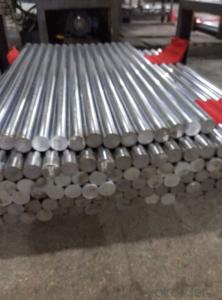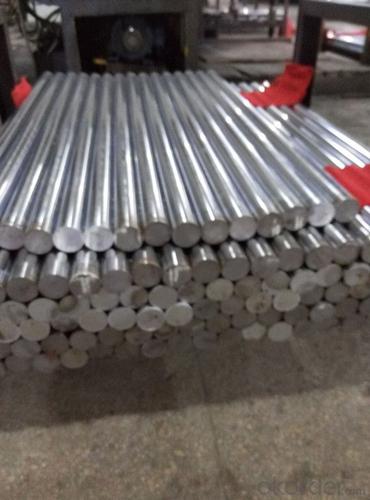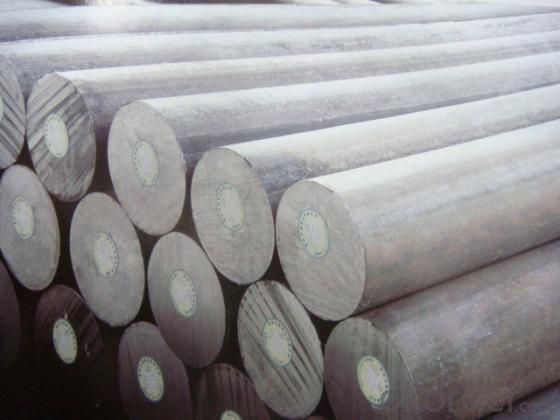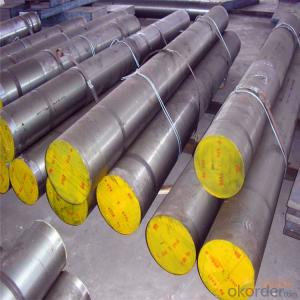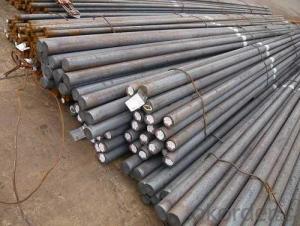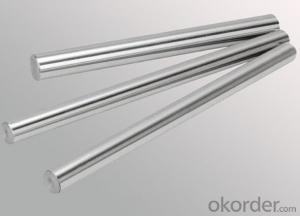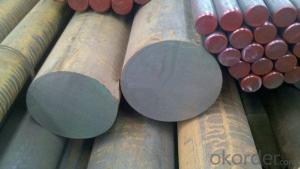Forged AISI 52100 Steel Hot Rolled Round Bar Steel
- Loading Port:
- Tianjin
- Payment Terms:
- TT OR LC
- Min Order Qty:
- 25 m.t.
- Supply Capability:
- 50000 m.t./month
OKorder Service Pledge
OKorder Financial Service
You Might Also Like
Specification
Forged AISI 52100 Steel Hot Rolled Round Bar Steel
Product Details:
1. AISI 52100/EN31/GCr 15/ DIN 1.3505/JIS SUJ2 bearing steel round bar
2.Hot rolled or forged condition, annealing , black or milled surface
3.Hardness: ≤210HBS ;
4 Hot rolled technology:EAF+LF+VD
Forged technology: EAF+LF+VD+ESR+Forging +Q T + Machined surface
5.Ultrasonic test standard: SPE1921-GR3, CLASS C/C
6.Production leadtime: 7~10 days
Chemical Composition:
C | Si | Mn | P | S | Cr | Mo |
0.95-1.05 | 0.15-0.35 | 0.25-0.45 | ≤0.025 | ≤0.025 | 1.4-1.65 | 0.1 max |
Advantage:
1)good comprehensive properties
2)good perfomance in cutting and processing after spheroids annealing
3)high hardness and homogrnization after quenching and tempering
4)high abrasive resistance and fatigue resistance
5)large amount of metal elements
6)Top quality
7)GCr15 is the most widely used bearing steel
Application:
Our products have been used in all kinds of areas, such as aviation,aerospace,navigation,nuclear energy,chemical
industry,electronic information,achine manufacture, petrochemical, automotive,instrument and meter, Communication ,
transportation, and medical instruments, etc.
Product Show:
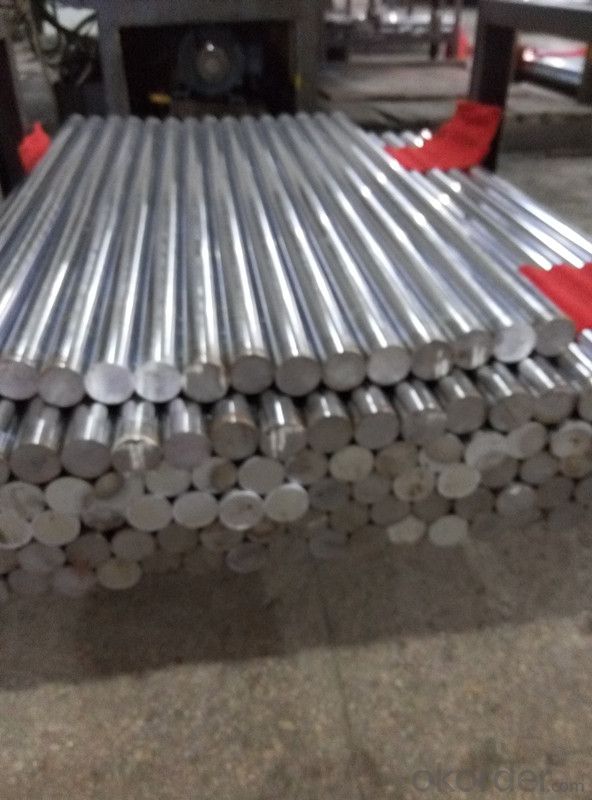
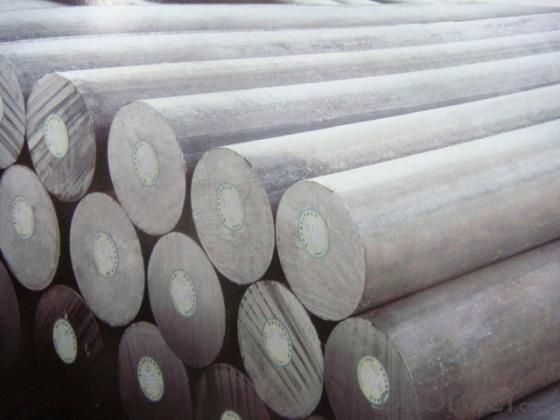
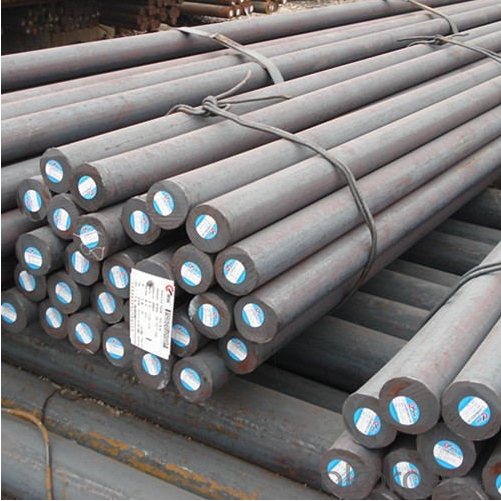
- Q: How does special steel perform in power generation applications?
- Due to its exceptional properties and performance, special steel holds great value in power generation applications. Power generation equipment, such as gas turbines, steam turbines, and nuclear reactors, operate under extreme conditions characterized by high temperature, pressure, and corrosive environments. Specifically designed to withstand these harsh conditions, special steel alloys offer numerous advantages in power generation. First and foremost, special steel demonstrates excellent heat resistance, making it an ideal choice for power generation equipment operating at high temperatures. With a high melting point, this steel can maintain its structural integrity and mechanical properties even when exposed to elevated temperatures. This is particularly crucial for gas turbines and steam turbines, as they convert thermal energy into mechanical energy to generate power. Secondly, special steel possesses superior strength and toughness, making it highly suitable for power generation applications that demand reliable and durable components. Power plants operate continuously, often for extended periods, and endure significant mechanical stresses. Special steel can bear these loads without deformation or failure, ensuring the safe and efficient operation of power generation equipment. Furthermore, special steel exhibits excellent resistance to corrosion and oxidation, which are prevalent in power generation environments. This steel is designed to combat the corrosive effects of high-temperature gases, steam, and water, thereby guaranteeing the longevity of power generation equipment. Power plants commonly utilize corrosion-resistant alloys of special steel to prevent material degradation and maintain operational efficiency. Moreover, special steel offers excellent weldability and machinability, in addition to its mechanical and corrosion-resistant properties. This facilitates the fabrication and assembly of power generation equipment, ultimately reducing production time and costs. In summary, special steel is a reliable and high-performance material for power generation applications. Its exceptional heat resistance, strength, toughness, corrosion resistance, and weldability make it the ideal choice for gas turbines, steam turbines, and other power generation equipment. The utilization of special steel in power generation enhances efficiency, reliability, and longevity of these critical systems.
- Q: Can special steel be used in the agricultural equipment manufacturing industry?
- Yes, special steel can be used in the agricultural equipment manufacturing industry. Special steel, which includes alloys such as stainless steel and high-strength steel, offers superior strength, durability, corrosion resistance, and heat resistance properties. These qualities make it suitable for various agricultural equipment components like plows, tillers, harvesters, and machinery parts. Special steel can enhance the performance and lifespan of agricultural equipment, ensuring that they can withstand the demanding conditions and rigorous use in the industry.
- Q: How is high-temperature steel used in the production of furnace components?
- High-temperature steel is used in the production of furnace components due to its exceptional heat resistance and strength. This type of steel can withstand extreme temperatures without losing its structural integrity, making it ideal for lining furnace walls, constructing heating elements, and manufacturing other critical parts that are exposed to intense heat.
- Q: How does special steel contribute to the tool manufacturing industry?
- The tool manufacturing industry greatly relies on special steel, as it offers numerous benefits that enhance the quality, performance, and durability of tools. First and foremost, special steel is widely recognized for its exceptional strength and toughness, making it an ideal choice for producing top-notch tools that can endure heavy usage and extreme conditions. Furthermore, special steel boasts excellent wear resistance. Tools crafted from special steel can maintain their sharpness and cutting edge for extended periods, reducing the need for frequent sharpening or replacement. This not only saves time and effort but also boosts productivity in industries heavily reliant on tools, such as construction, automotive, and aerospace. Additionally, special steel can be heat-treated to achieve specific properties, including hardness, which is crucial for tools like drills, saws, and blades. This heat treatment process enables manufacturers to tailor the characteristics of the steel to meet the unique requirements of different tools, ensuring optimal performance and effectiveness. Moreover, special steel provides corrosion resistance, a vital feature for tools exposed to moisture, chemicals, or harsh environments. By preventing rust and corrosion, special steel helps prolong the lifespan of tools, reducing maintenance costs and ensuring consistent performance over time. Furthermore, the versatility of special steel allows manufacturers to create tools with intricate shapes and designs. This flexibility opens up possibilities for innovation and the development of specialized tools catering to specific applications and industries. Special steel can be easily machined, welded, and formed into various tool designs, enabling manufacturers to produce efficient and ergonomic tools that offer improved handling and user comfort. In conclusion, special steel plays a significant role in the tool manufacturing industry by providing strength, wear resistance, heat treatability, corrosion resistance, and versatility. These properties facilitate the production of high-quality tools that are durable, reliable, and efficient, meeting the demands of diverse industries and enhancing productivity.
- Q: How does special steel contribute to the aerospace material recyclability?
- Special steel contributes to aerospace material recyclability in several ways. First, special steel is known for its high strength-to-weight ratio, making it a preferred choice for critical components in aircraft. This means that when these components reach the end of their service life, they can be recycled and repurposed without compromising the safety and structural integrity of the aircraft. Additionally, special steel is highly durable and resistant to corrosion, making it suitable for long-term use in harsh aerospace environments. This durability ensures that the steel can be recycled multiple times without significant degradation in its mechanical properties, further enhancing the recyclability of aerospace materials. Moreover, the metallurgical properties of special steel allow for efficient recycling processes. Steel is a highly recyclable material, and special steel alloys can be easily separated from other materials during the recycling process. This ease of separation and the high value of steel in the recycling market make special steel an economically viable choice for aerospace manufacturers and recyclers. In summary, special steel's strength, durability, corrosion resistance, and ease of recycling make it a valuable contributor to the recyclability of aerospace materials. By using special steel in aircraft components, the aerospace industry can enhance sustainability efforts and reduce the environmental impact of its operations.
- Q: How does special steel perform in cryogenic applications?
- Special steel performs well in cryogenic applications due to its ability to maintain its mechanical properties at extremely low temperatures. It has a low thermal expansion coefficient, high strength, and excellent toughness, which are essential characteristics for withstanding the extreme conditions of cryogenic environments. Additionally, special steel exhibits good resistance to corrosion and oxidation, making it suitable for use in cryogenic applications where exposure to low temperatures and cryogenic fluids is common.
- Q: What are the different methods for annealing special steel?
- Special steel can be annealed using various methods, each with its own objectives and outcomes. Some commonly employed techniques include the following: 1. Full annealing: To achieve maximum softness and enhanced ductility, the steel is heated above its critical temperature and held there for a specific duration. It is then gradually cooled to room temperature. This process facilitates easier machining and manipulation of the steel. 2. Isothermal annealing: After heating the steel above its critical temperature, it is promptly transferred to a furnace or chamber where it is maintained at a constant temperature. This controlled cooling results in a uniform and fine-grained microstructure. Isothermal annealing is particularly beneficial for complex-shaped parts, minimizing distortion and improving dimensional stability. 3. Spheroidize annealing: This technique is commonly employed for high-carbon steels. The steel is heated to a temperature slightly below its critical temperature and kept there for an extended period. This encourages the formation of spheroidized carbides, enhancing machinability and reducing brittleness. 4. Process annealing: Cold-worked steel undergoes this method to alleviate internal stresses and decrease hardness. The steel is heated below its critical temperature and then cooled in still air. Process annealing restores ductility and enhances formability. 5. Stress-relief annealing: Residual stresses resulting from welding or machining can be relieved using this method. The steel is heated below its critical temperature and then slowly cooled. Stress-relief annealing minimizes distortion and prevents cracking. It is crucial to consider factors such as steel composition, desired mechanical properties, and intended application when selecting the appropriate annealing method for special steel.
- Q: How does special steel contribute to the mining machinery industry?
- The mining machinery industry relies heavily on special steel, which provides exceptional strength, durability, and resistance to wear and corrosion. This specific type of steel is engineered to withstand the harsh conditions typically encountered in mining operations. In the mining machinery industry, equipment such as drills, excavators, loaders, crushers, and conveyor systems face extreme stress, heavy loads, and abrasive materials. Various parts of these machines, including buckets, tracks, cutting edges, gears, and hydraulic components, incorporate special steel components. The high strength and toughness of special steel ensure that mining machinery can endure the immense forces and impacts involved in mineral excavation, hauling, and processing. This durability extends the lifespan of the equipment, reducing the need for frequent replacements and minimizing downtime, resulting in cost savings for mining companies. Special steel's resistance to wear and corrosion is crucial in the mining industry. The presence of abrasive materials and corrosive substances in the mining environment can cause rapid deterioration of machinery components. However, special steel alloys are designed to resist wear and corrosion, enhancing the longevity and performance of mining machinery. Additionally, special steel allows mining machinery to operate efficiently and effectively. Its high strength-to-weight ratio allows for the construction of lightweight yet robust equipment, improving mobility and productivity in mining operations. The use of special steel also enables the design of complex components with intricate shapes, ensuring optimal functionality and performance. Overall, special steel is an essential material in the mining machinery industry. Its exceptional strength, durability, resistance to wear and corrosion, and ability to enhance efficiency make it a vital component in the design and construction of mining equipment. By incorporating special steel, mining machinery can withstand the challenging conditions and heavy-duty tasks involved in mining operations, ultimately contributing to increased productivity, reduced costs, and improved safety in the industry.
- Q: How is special steel used in the production of injection molds?
- Due to its unique properties, special steel is widely utilized in the manufacturing of injection molds, which play a vital role in the production of various plastic and metal items through the injection molding process. The excellent heat resistance of special steel is one of the main factors behind its preference in injection molds. When the molten material is injected into the mold at high pressure and temperature, special steel can endure these extreme temperatures without warping or losing its shape. This ensures the final product's accuracy and precision. Furthermore, special steel exhibits remarkable hardness and wear resistance. Given that injection molds are subjected to frequent use, wear and tear can occur, leading to dimensional inaccuracies and a decline in product quality. By employing special steel, which is specifically designed to resist wear, the lifespan of injection molds is extended, guaranteeing consistent and high-quality production. Moreover, special steel offers good machinability, enabling the precise fabrication of intricate and complex mold designs. This capability is crucial in the production of molds with intricate geometries and precise details, which is essential for manufacturing complex plastic or metal parts. Additionally, special steel provides a superior surface finish for the molded products. The use of special steel in the creation of injection molds results in smooth and polished surfaces, ensuring that the final products possess a high-quality finish. In conclusion, special steel is extensively utilized in the production of injection molds due to its exceptional heat resistance, hardness, wear resistance, machinability, and surface finish. These properties make it an ideal material for ensuring accurate and precise manufacturing of plastic and metal products through the injection molding process.
- Q: What are the key differences between special steel and tool steel?
- Special steel and tool steel are both types of steel that have specific properties and applications. However, there are some key differences between the two. 1. Composition: Special steel is a broad term that encompasses a variety of steel alloys with specific properties for different applications. It can include stainless steel, high-strength alloy steel, and heat-resistant steel, among others. On the other hand, tool steel is a specific type of special steel that is designed to be used in the production of tools, dies, and molds. Tool steel typically contains higher levels of carbon and other alloying elements like chromium, vanadium, or tungsten, which enhance its hardness, wear resistance, and toughness. 2. Hardness and wear resistance: Tool steel is known for its exceptional hardness and wear resistance, which makes it ideal for cutting, shaping, and forming materials. It can withstand high temperatures and resist deformation, ensuring the longevity of tools and dies. Special steel, on the other hand, may not have the same level of hardness and wear resistance as tool steel, as its properties vary depending on the specific alloy and application. Special steel alloys may prioritize other properties like corrosion resistance or strength. 3. Manufacturing processes: Tool steel is often produced through specialized manufacturing processes like hot working, cold working, or heat treatment to achieve the desired properties. The production of tool steel involves precise control of temperature and cooling rates to achieve the required hardness and toughness. Special steel, on the other hand, may undergo various manufacturing processes depending on the desired properties. These can include forging, casting, or heat treatment, among others. 4. Applications: Tool steel is primarily used in the production of tools, dies, and molds for manufacturing processes such as cutting, shaping, and forming materials. It is commonly used in industries like automotive, aerospace, and machinery. Special steel, on the other hand, has a wide range of applications depending on the specific alloy and properties. It can be used in industries such as construction, energy, and manufacturing, where specific properties like corrosion resistance, heat resistance, or strength are required. In summary, the key differences between special steel and tool steel lie in their composition, hardness, wear resistance, manufacturing processes, and applications. While special steel is a broad term for various steel alloys with specific properties, tool steel is a specific type of special steel designed for tooling applications. Tool steel is characterized by its exceptional hardness and wear resistance, making it ideal for cutting and shaping materials, while special steel can have a broader range of properties depending on the specific alloy and application.
Send your message to us
Forged AISI 52100 Steel Hot Rolled Round Bar Steel
- Loading Port:
- Tianjin
- Payment Terms:
- TT OR LC
- Min Order Qty:
- 25 m.t.
- Supply Capability:
- 50000 m.t./month
OKorder Service Pledge
OKorder Financial Service
Similar products
Hot products
Hot Searches
Related keywords
